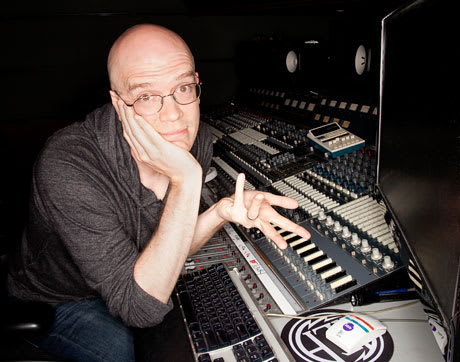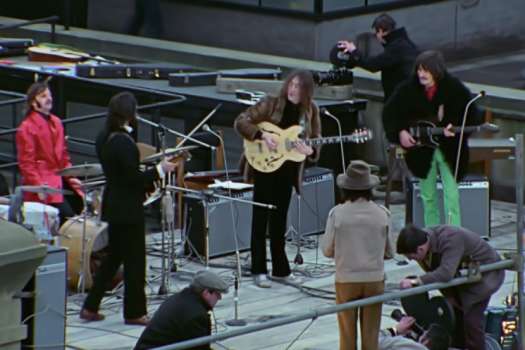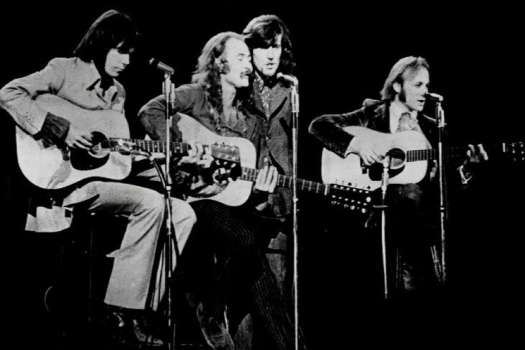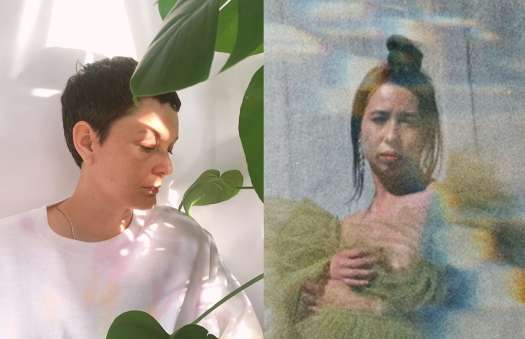Devin Townsend is known for the sonic complexity of his musical work, whether its fronting now-retired metal band Strapping Young Lad, recording solo work or producing notable heavy acts like Gwar, Soilwork and Misery Signals. Despite the layering of track upon track in each recording Townsend masterminds, he's not into studio tinkering. For Canada's mad musical scientist, studio work is not a pleasure in itself but a way of getting the music across. That philosophy has shaped how he approaches the recording process and has made "actualizing" his music part of its creation.
Townsend dates his interest in production back to childhood (age seven or eight), soon after he started playing guitar. Heading for the back room recording department in Vancouver's Long & McQuade, he rented four-track cassette recorders to create "strange little rudimentary things." Even earlier gear included a makeshift set-up of two ghetto blasters, and he recalls moving back and forth to record on one machine while the other played. "I always thought that [recording] was part and parcel of what I do," he says.
Currently fronting the Devin Townsend Project, the multi-instrumentalist and studio guru prefers to be at the helm throughout the creative process, handing over only the mastering to someone else. "I record, I engineer, I mix, I produce," Townsend lists. "And I'm much more satisfied doing it myself." Recent release Deconstruction is a rare exception, where the time demands of family life, touring and doing interviews drove him to recruit Sweden's Jens Bogren (Fascination Street Studios) to begin the mix. These days Townsend produces only his own music, avoiding the "micromanaging" involved in helping others' convey their musical ideas.
How Townsend's approach has changed over time has more to do with evolving technologies than philosophy. "Even up to 15 years ago, to do what I do now while I'm riding the bus took me renting a room for $700 a day and an engineer and all that. But my process is pretty much identical." Except for drums, which he records in Vancouver studios like the Factory, Townsend's recording is mobile, reliant on interfaces, digital plug-ins and a laptop. Mobility allows him to record in spaces – claustrophobic city apartments, rural getaways – that resonate with the sounds he's creating.
Technology, for Townsend, is a way of streamlining the movement from inspiration to art. He declares himself free of "option anxiety" (the need to fiddle around in search of the best possible sound) partly because he knows his tools and what works best where – like Fractal Audio's Axe-FX digital guitar amplifier, live and in studio: "It's a phenomenal sounding unit and I've tweaked it for so long that when I'm actually in the studio I know exactly what to expect.
I think the thing that is most important to me in terms of recording is the speed of actualizing the ideas," he explains. "The sooner I can get it out the sooner I can make that creative impulse work as opposed to spending a ton of time and effort trying to decide which preamp I'm gonna use or whatever. That makes me crazy to be honest. That being said, there's a lot of tinkering and options in terms of music." Tinkering then, is a matter of musical and creative spontaneity, even improvisation, rather than gadgets: writing and recording are intertwined.
Sonic depth and density link Townsend to Phil Spector's "wall of sound," but Canada's West coast native names, instead, three formative records from his youth that "were the best sounding records at the time": Def Leppard's Hysteria, Enya's Watermark and "the Metallica stuff with Randy Staub mixing and Bob Rock." Classical music is another influence, but Townsend has aspirations to next record something less alienatingly complex.
Such intricate music requires careful attention in the studio whether a song is "ethereal" or "claustrophobic" – focusing on one track at a time, filtering and scooping frequencies, panning different melodies, so that the details never collapse into a "big blurry mellow thing" or "a blob of shit." And conveying the right feeling is key, a delicate process.
The emotional impact that a piece of music has to me – I think it's a real fine line between that translating to people and it not, so for me to have control over how it's recorded at least allows it to translate in a quicker way," Townsend relates. This translation demands an actual physical recording, an object in hand that he can look to as the vehicle for his musical intentions before chasing the next inspiration. "To me, making music ultimately ends up and leads to documenting it. And then once it's done I feel like I can move on."
Townsend dates his interest in production back to childhood (age seven or eight), soon after he started playing guitar. Heading for the back room recording department in Vancouver's Long & McQuade, he rented four-track cassette recorders to create "strange little rudimentary things." Even earlier gear included a makeshift set-up of two ghetto blasters, and he recalls moving back and forth to record on one machine while the other played. "I always thought that [recording] was part and parcel of what I do," he says.
Currently fronting the Devin Townsend Project, the multi-instrumentalist and studio guru prefers to be at the helm throughout the creative process, handing over only the mastering to someone else. "I record, I engineer, I mix, I produce," Townsend lists. "And I'm much more satisfied doing it myself." Recent release Deconstruction is a rare exception, where the time demands of family life, touring and doing interviews drove him to recruit Sweden's Jens Bogren (Fascination Street Studios) to begin the mix. These days Townsend produces only his own music, avoiding the "micromanaging" involved in helping others' convey their musical ideas.
How Townsend's approach has changed over time has more to do with evolving technologies than philosophy. "Even up to 15 years ago, to do what I do now while I'm riding the bus took me renting a room for $700 a day and an engineer and all that. But my process is pretty much identical." Except for drums, which he records in Vancouver studios like the Factory, Townsend's recording is mobile, reliant on interfaces, digital plug-ins and a laptop. Mobility allows him to record in spaces – claustrophobic city apartments, rural getaways – that resonate with the sounds he's creating.
Technology, for Townsend, is a way of streamlining the movement from inspiration to art. He declares himself free of "option anxiety" (the need to fiddle around in search of the best possible sound) partly because he knows his tools and what works best where – like Fractal Audio's Axe-FX digital guitar amplifier, live and in studio: "It's a phenomenal sounding unit and I've tweaked it for so long that when I'm actually in the studio I know exactly what to expect.
I think the thing that is most important to me in terms of recording is the speed of actualizing the ideas," he explains. "The sooner I can get it out the sooner I can make that creative impulse work as opposed to spending a ton of time and effort trying to decide which preamp I'm gonna use or whatever. That makes me crazy to be honest. That being said, there's a lot of tinkering and options in terms of music." Tinkering then, is a matter of musical and creative spontaneity, even improvisation, rather than gadgets: writing and recording are intertwined.
Sonic depth and density link Townsend to Phil Spector's "wall of sound," but Canada's West coast native names, instead, three formative records from his youth that "were the best sounding records at the time": Def Leppard's Hysteria, Enya's Watermark and "the Metallica stuff with Randy Staub mixing and Bob Rock." Classical music is another influence, but Townsend has aspirations to next record something less alienatingly complex.
Such intricate music requires careful attention in the studio whether a song is "ethereal" or "claustrophobic" – focusing on one track at a time, filtering and scooping frequencies, panning different melodies, so that the details never collapse into a "big blurry mellow thing" or "a blob of shit." And conveying the right feeling is key, a delicate process.
The emotional impact that a piece of music has to me – I think it's a real fine line between that translating to people and it not, so for me to have control over how it's recorded at least allows it to translate in a quicker way," Townsend relates. This translation demands an actual physical recording, an object in hand that he can look to as the vehicle for his musical intentions before chasing the next inspiration. "To me, making music ultimately ends up and leads to documenting it. And then once it's done I feel like I can move on."




